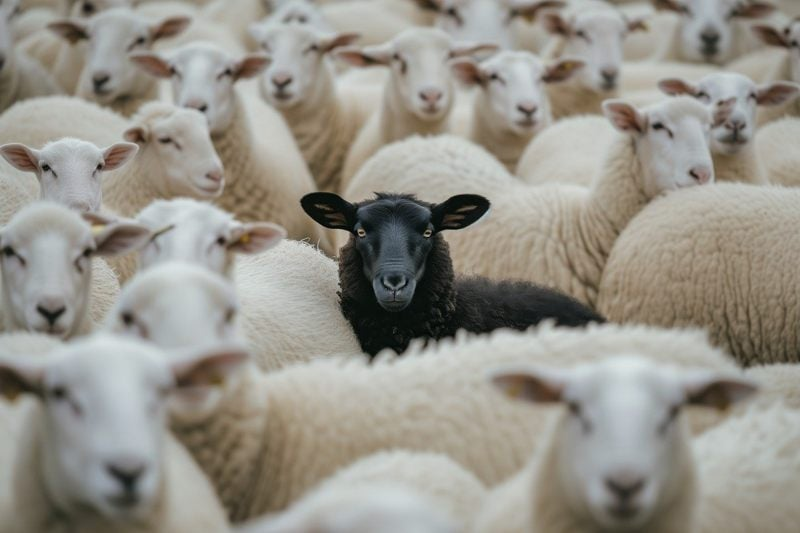Are you feeling like the odd one out in your family? Have you been thinking maybe you are the black sheep of the family? Here, we will help you with the various signs that indicate you are the black sheep of the family.

Every family has its dynamics, but being the “black sheep” often means feeling like the odd one out. If you’ve noticed a disconnect between you and your relatives, feel misunderstood, or sense that your opinions and lifestyle choices set you apart, you might fit this role.
While it can be challenging, being the black sheep also comes with a sense of individuality and strength.
Keep reading as we help you to know the key signs that you might be the black sheep of your family and how to embrace your uniqueness while navigating family relationships.
Signs You Are the Black Sheep of the Family

Here are potential signs you may be the black sheep of the family:
1. You Feel Constantly Misunderstood
Feeling misunderstood by your family can be one of the most telling signs of being the black sheep. If your thoughts, choices, or emotions are often met with confusion, judgment, or dismissal, it’s likely because you see the world differently than your family does.
This can lead to a sense of isolation, as your perspectives might clash with their expectations or norms.
Whether it’s your career path, lifestyle, or personality, your uniqueness might make it hard for others to connect with or accept you fully. This disconnect can make family gatherings uncomfortable and deepen your sense of being out of place.
2. You Don’t Share the Same Interests With Your Family
Families often bond over shared hobbies, traditions, or pastimes, but as the black sheep, you may find yourself uninterested in or excluded from these activities. This lack of shared interests can lead to feeling left out or like you’re not part of the group.
Over time, this gap can widen, making it harder to relate to or engage with your family. It’s also an opportunity to explore your own passions and form connections with others who share your interests, creating a support system outside your family.
3. You’re the Target of Criticism in Your Family
If you often feel like the scapegoat in your family, facing criticism or blame disproportionately, it’s a clear sign of being the black sheep. Whether it’s about your choices, behavior, or circumstances beyond your control, black sheep are frequently singled out and judged unfairly.
This criticism can come in subtle forms, like backhanded compliments, or overtly, through direct accusations.
Over time, this can take a toll on your self-esteem and make you feel like you’re always walking on eggshells. However, being the target of criticism doesn’t define your worth.
4. Your Achievements Are Overlooked
As the black sheep, your accomplishments may go unnoticed or be downplayed while others in your family receive praise for even minor successes. This lack of recognition can make you feel undervalued and invisible.
You might find that no matter how hard you work or how much you achieve, it’s never enough to earn the same level of acknowledgment. This dynamic can create resentment and distance within the family.
It’s important to celebrate your achievements on your own terms and surround yourself with people who genuinely appreciate and support your successes.
5. You Feel Excluded from Family Events
Another sign of being the black sheep is feeling left out of family gatherings or plans. If you’re often informed about events last minute or not included in group decisions, it can reinforce the idea that you’re not a priority. Even when you’re invited, you might sense that your presence isn’t genuinely valued.
This exclusion can be subtle, like not being asked for input, or overt, such as being outright ignored. While this can be hurtful, it’s a reminder to focus on building connections with people who respect and include you wholeheartedly.
6. Your Opinions Are Often Ignored During Family Meetings
When your family dismisses your ideas or disregards your input, it can feel like your voice doesn’t matter. Whether it’s during casual conversations or important decisions, being overlooked can be frustrating and isolating.
This lack of validation might discourage you from speaking up altogether, further reinforcing your role as the black sheep.
It’s important to remember that your opinions are valid, even if they aren’t appreciated in certain circles. Finding spaces where your voice is heard and respected can help rebuild your confidence.
7. You’ve Been Given a Negative Label
Being branded as the “rebel,” “troublemaker,” or “different one” often solidifies the feeling of being the black sheep. These labels can be damaging, as they box you into a role that may not truly reflect who you are.
Even if you’ve grown beyond past mistakes or behaviors, family members may continue to see you through a negative lens.
This labeling can create a self-fulfilling prophecy, making it harder to break free from the role assigned to you. Embracing your authentic self, regardless of labels, is key to reclaiming your identity.
8. You’re More Independent
Black sheep often find solace in independence, distancing themselves from family dynamics that feel restrictive or judgmental.
This independence might manifest in pursuing a career, lifestyle, or relationships that differ from family expectations. While this autonomy is empowering, it can also deepen the divide between you and your family.
Your ability to stand on your own is a strength, even if it’s misunderstood or unappreciated by those closest to you. Lean into this independence and use it as a foundation for building a life that aligns with your values.
9. You Have Different Values or Beliefs
Conflicting values, beliefs, or lifestyles are common reasons for feeling like the black sheep. If your family doesn’t respect or accept your choices, it can lead to feelings of alienation. However, these differences are a testament to your individuality and courage to live authentically.
Surrounding yourself with people who share or respect your values can provide the acceptance and connection you may not find within your family.
10. You Feel Like You Don’t Belong
At its core, being the black sheep is characterized by an overwhelming sense of not fitting in with your family. This feeling of not belonging can lead to loneliness, self-doubt, and a desire to seek connection elsewhere.
Although it’s natural to crave acceptance from your family, it’s important to recognize that your worth isn’t defined by their approval. Building a supportive network outside your family can help you find the belonging and love you deserve.
In conclusion, being the black sheep can be challenging, but it also highlights your uniqueness and resilience. Focus on building relationships with people who appreciate and celebrate you for who you are.
Related Searches:
